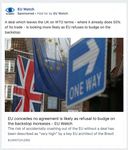Reining in the Political 'Wild West' Campaign Rules for the 21st Century - Edited by Michela Palese and Josiah Mortimer February 2019
←
→
Page content transcription
If your browser does not render page correctly, please read the page content below
Reining in the Political ‘Wild West’ Campaign Rules for the 21st Century Edited by Michela Palese and Josiah Mortimer February 2019
Acknowledgements We are extremely grateful to all contributors to this report (and their staff), who spent so much time and effort helping us push forward this important issue: Rt Hon Dame Cheryl Gillan MP, Tom Hawthorn from the Electoral Commission, Dr Martin Moore and Dr Damian Tambini, Stephen Kinnock MP, Bethany Shiner, Kyle Taylor from Fair Vote, Cassie Staines from Full Fact, Steve Wood from the Information Commissioner’s Office, Jacob Ohrvik-Stott from Doteveryone, and – last but definitely not least – Josh Smith from the Centre for the Analysis of Social Media at Demos. Thank you also to Jess Garland, Doug Cowan, and Lizzie Lawless at the Electoral Reform Society for helping us bring together this report. 2 Reining in the Political ‘Wild West’
Contents
5 Foreword
Rt Hon Dame Cheryl Gillan MP
11 Introduction
17 Giving voters greater confidence
Tom Hawthorn, Electoral Commission
21 The risks of inaction
Martin Moore & Damian Tambini
25 Empowering the regulators
Stephen Kinnock MP
29 The legal landscape
Bethany Shiner
35 Avoiding the American model
Kyle Taylor, Fair Vote Project
39 Increasing the resilience of our democracy
Cassie Staines, Full Fact
43 Reining in the tech giants
Steve Wood, ICO
51 A new Office for Responsible Technology
Jacob Ohrvik-Stott, Doteveryone
55 The technical future of political campaigns
Josh Smith, CASM at Demos
Electoral Reform Society 3Foreword
Our democracy is at a critical juncture. We live in a
time when our democratic processes face
considerable threats from a range of sources –
from ‘dark ads’ and fake news, to foreign
interference and the misuse of personal data on a
monumental scale.
Rt Hon Dame Cheryl Gillan The year 2000 – when our election rules were
Conservative MP for largely written – was a time before social media as
Chesham and Amersham
we know it. Twitter and Facebook did not exist. It
was a time of floppy discs and dial-up internet.
Smart phones were practically unheard of. In
short, the ability to rapidly transmit
disinformation and channel millions of pounds
into campaigns without scrutiny was far more
difficult. So much has changed – yet our campaign
rules have remained in the analogue age.
If we do not update the rules governing our
elections and referendums, the credibility of our
elections faces a ‘perfect storm’ of threats, as the
chair of the Electoral Commission has warned1.
1. Holmes, Sir John (2017). The increasing use of online campaigning has
Speech to the Institute for
Government, 6 December exposed the many loopholes that can allow people
2017. https://www. to circumvent our rules perfectly legally in the
electoralcommission.org.
uk/__data/assets/pdf_ digital realm. The traditional principles of fairness
file/0006/238137/
IFG-speech-Dec-2017-.pdf
and transparency underlying our democratic
Electoral Reform Society 5processes are being undermined by a multiplicity
of actors and processes. Online political
campaigning has effectively become an unbridled
Wild West.
The effects of this online Wild West go beyond
these attempts at undermining our rules and
regulations. The quality of political discourse itself
is under attack, as the Electoral Reform Society
showed with their 2016 report It’s Good to Talk2:
2. Brett, Will (2016). It’s debate has become increasingly polarised and
Good to Talk: Doing
Referendums Differently. tribal, facilitated by online filter bubbles and echo
https://www.electoral- chambers. This, combined with poor quality
reform.org.uk/latest-news-
and-research/publications/ information, has created a toxic climate which is
its-good-to-talk/
stifling genuine political debate.
As rapporteur on referendums for the
Committee on Political Affairs and Democracy of
the Council of Europe’s Parliamentary Assembly, I
am well aware of the challenges that face our
election and referendum rules – and of the
remarkable work that is being done to address
these threats.
The need to look at this issue in the round is
vital given the huge overlap between the issues
involved. Yet to date there has been little to thread
these responses and research together. That is why
this report brings together an unprecedented range
of voices – from regulators to campaigners and
academics – to address these challenges and offer
solutions on what digital-age campaign regulation
would look like.
When faith in the integrity of elections is
undermined, democracy suffers. Tom Hawthorn
of the Electoral Commission looks at what should
be done to enhance voters’ confidence in digital
campaigning. He sets out the actions that can and
should be taken by legislators and social media
companies to update our election rules and
increase transparency in digital campaigning.
6 Reining in the Political ‘Wild West’Academics Martin Moore and Damian
Tambini similarly raise the pressing need to
update our outdated electoral law, and reinforce
the calls made by our regulators to ensure they
have sufficient powers to deal with the changes
brought about by online campaigning.
In his contribution, Stephen Kinnock MP
considers how we can enhance transparency
around campaign finance. To this end, in
collaboration with Fair Vote and the Electoral
Reform Society, he announces the planned launch
of an All-Party Parliamentary Group on Electoral
Campaigning Transparency that seeks to
investigate how our democratic processes can best
be protected.
Legal expert Bethany Shiner examines the
laws surrounding ‘big data’ in politics, and what a
statutory code of practice – as proposed by the
ICO – should take into account.
Kyle Taylor, founder of Fair Vote, considers
how we can constrain the role of money in politics
in the digital age and update our election rules. He
sets out three areas where urgent reform is needed
– such as setting funding caps and modernising
spending reporting.
Cassie Staines of Full Fact focuses on
misinformation and how best to respond to it.
Rather than overreacting to the ‘panic’ about fake
news, she highlights that we need to increase our
democracy’s resilience against misinformation. She
argues any action against misinformation must be
proportionate and cautious about potential
unintended consequences.
In conversation with the ERS, Deputy ICO
Commissioner Steve Wood discusses how the data
regulator is navigating the changing environment
around the political use of personal data. He speaks
about why an ethical pause in political advertising
might be the best way of getting different actors to
Electoral Reform Society 7come together, and assesses the powers of the ICO
and Electoral Commission.
In their contribution, Doteveryone reiterate
their call for the establishment of an Office for
Responsible Technology to address the challenges of
the existing regulatory landscape. This Office would
be an independent regulator tasked with empowering
existing and future regulators, informing the public
and policymakers about online benefits and harms,
and supporting people to seek redress when their
digital rights have been breached.
Finally, Josh Smith of the Centre for the
Analysis of Social Media at Demos considers the
future of political campaigning in the face of new
and advanced forms of technology, such as AI and
deep learning. As he argues, technologies should be
used to improve our political process – not to
manipulate them – and should be clearly
understood by users and targets.
The contributors to this report have suggested
proposals that are realistic and feasible, some of which
would require little change to our existing rules.
A common thread running through all
contributions is the urgent need to increase
transparency in relation to campaign messaging. As
stated in the report I presented to the Committee
on Political Affairs and Democracy of the Council
of Europe’s Parliamentary Assembly, “voters should
be able to find out what claims campaigners are making
and who is making them. They should also be able to see if
campaigners are putting out contradictory messages to
different groups of voters or seeking to portray different
3. Parliamentary images of themselves to different voters.”3
Assembly of the Council of
Europe (2019). Updating Though they acknowledge that tech platforms
guidelines to ensure fair have recently taken some steps in the right
referendums in Council of
Europe member States. direction, all contributors agree that it would be
http://assembly.coe.int/nw/
xml/XRef/Xref-XML2HTML
unwise to leave the regulation of online
-en.asp?fileid=25231& campaigning to private tech companies alone. That
lang=en
is no way to defend the integrity of our democracy,
8 Reining in the Political ‘Wild West’and action is needed to ensure that how we rein in
the online Wild West has the best interests of the
democratic community as a whole at its heart.
The calls for a comprehensive review of our
campaign laws have never been so widespread.
Regardless of when the next election or
referendum takes place, now is the time to bring
our rules into the 21st century – before this spirals
out of our control.
Electoral Reform Society 9Produced Anthony Skottowe, Vaughan Jones, Trig
with the
Maurice Husbands, Ellis, Sallie Ranken,
Anthony Brown, Alan James Fraser, Erik
generous Hedges, Martin
Noble, Oliver
Williams, David
Minns, Sheila Abrams,
support of Johnson, Catherine Roger Newton, Mary
Millar, Jennifer Smart, Walsh, Michael Rand,
David Ockenden, Clive Constance, Joan
Kathryn Heath, Tom Coverley, Simon
Marshall, Graham Robbins, Eileen Ryan,
Partridge, Rosalind J Hackett, Mike
Kent, Simon Ryder- Pritchard, Paul
Smith, Andrew Duff, Marchant, Michael
Shaun Coster, Gallagher, Jamie
Malcolm Macintyre- Wrench, Rayworth
Read, Robert Cranidge, Johnni
Maltby Pindar, Chambers, Jacky Mccloskey, Thom
William Watson, Castle, Edward Saunders, Jack Coy,
Christopher Marriage, Glynn, Rod Fay, Susan Vic Lloyd, Ian
Christopher Dorling, Kaberry, Tony Browne, Jonathan
Susan Kendrick, John Gowland, David Westwood, Anthony
Derrick, Jacquie Royle, John Taylor, Best, David Shevels,
Salfield, Patrick Gordon Drummond, Barry Edwards,
Salaun, Alyson Hall Christine Twine, Geoffrey Band, M J
Yandoli, George David Page, Franey, Nicholas
Dent, Julian Burn, Christopher Janet Dakin, Alan Sturrock,
Teresa O’Brien, Paul Mears, Alan Picton, Alan Legge, Elizabeth
E G Cope, KJ Julian Tippett, Dennis Sturges, Philip
Swainson, Sheila Walton, Tom Beard, Moynan, David
O’Reilly, Martin David Croome, Curtis, Valerie Outfin,
Kilbey, Tim Baynes, Michael Pickles, Leonard Morrison,
David Nolan, David Simon Campbell- Neal Pearson, Paul
Green, Tom Nicholls, Jones, Chris Gregg, Settles, Jeremy
Lucy Hall, Mick Geoffrey Bailey, Woolwich, Oliver
Crews, Edmund Caroline Bentley, Bettis, Graham Hale,
Wright, Helen Bore, George Allan, Kim Kim Grais, David
Roy Meddings, Lesley Greensmith, Julie Dugdale, Martin
George, Peter Allen, Whitley, Alexander Shaw, Alan Reynolds,
Ian Cridland, Jablonski, Tom Willis, Richard Roberts.
10 Reining in the Political ‘Wild West’Introduction
Political party campaigning has shifted
dramatically online in recent years. To give just one
example: political parties spent around £1.3 million
on Facebook adverts during the 2015 general
election. This more than doubled two years later,
with parties spending around £3.2 million on
Dr Jess Garland Facebook in the 2017 campaign4.
Director of Policy and This report coincides with the 15th anniversary
Research at the Electoral
Reform Society of Facebook’s launch. It is also 19 years since our
main election rules were created. Since 2003, the
4. Electoral Commission Electoral Commission has been calling for online
(n.d.). Political party
spending at elections. ‘imprints’ (showing who has paid for and published
https://www. political materials), yet no government has grasped
electoralcommission.org.
uk/find-information-by- the nettle and taken the necessary action to update
subject/political-parties-
campaigning-and-
the rules.
donations/ As the use of online political campaigning has
political-party-spending-
at-elections grown, so too have concerns about the implications
for our democratic processes. Though online
campaigning is not new, it has changed significantly
in terms of scale, reach and sophistication.
Underlying these concerns is the fact our rules
have not kept up with the shifting nature of
campaigning, and our regulators appear powerless
in the face of threats. Despite recent scandals,
online political campaigning remains an almost
Electoral Reform Society 11It is widely agreed that the entirely unregulated Wild West.
terms mis- and dis-
information should be used This has implications for the principles of
in place of ‘fake news’ (e.g. transparency, fairness and the notion of a level playing
by the Digital, Culture,
Media and Sport select field that are supposed to govern our elections.
committee, Full Fact, and
others). Full Fact defines
Imprint requirements, for example, apply to
misinformation as ‘the campaign material in print, but not online. This
inadvertent spread of false
or misleading information’, means that voters cannot be certain of who created
and disinformation as ‘the an online political advert. It also has implications for
deliberate use of false or
misleading information to the spread of mis- and dis-information5: purveyors of
deceive audiences’.
false or misleading information cannot be held to
5. Full Fact (2018). Tackling account if their identity cannot be verified.
misinformation in an open society.
https://fullfact.org/media/ ‘Dark ads’ can be micro-targeted to individual
uploads/full_fact_ voters who may not be aware of the fact they are
tackling_misinformation_
in_an_open_society.pdf being targeted, and why. As these ads are visible
only to the creator and the individual or group
being targeted, different voters can be targeted
with conflicting information without the sender
facing any scrutiny.
These techniques as well as playing into tribalism
and polarisation in politics are also moving
democratic life outside of our shared public space.
The shift to online campaigning also creates
problems for regulating money in politics and for
attempts to create a level playing field. With online
material, cost does not have the same direct
correlation with reach that it does with printed
materials: lower spending does not necessarily
mean fewer people seeing the ads.
Additionally, reporting of spending online is
subject to limited regulatory oversight (parties, for
example, do not need to provide a breakdown of
social media spend). This makes it now easier than
ever to blur what is spent at the local/constituency
level and nationally. In this context,spending caps
appear increasingly meaningless.
Traditionally, most political campaigning
occurred around fixed political moments (elections
and referendums) given the time, financial and
resource costs involved. This is reflected in the two
12 Reining in the Political ‘Wild West’main pieces of legislation governing party
campaigning – the Political Parties, Elections and
Referendums Act (PPERA) 2000 and the
Representation of the People Act (RPA) 1983. But
the cheap and easy access to new campaigning
techniques available online means that political
parties have shifted to low-cost, 24/7 campaigning,
outside of regulated periods.
The growing role of a handful of private tech
companies and external agencies exacerbates these
concerns. Tech platforms do not have the same
liability as traditional news outlets, and the fact that
they are not based in the UK raises jurisdictional
and regulatory enforcement concerns. External
agencies are increasingly involved in data collection
and analysis, including outside of regulated
campaign periods, but the extent of their
involvement remains hard to ascertain.
For all these reasons, we support the proposals
that are put forward by the contributors to this
report:
llIn the short term, extending the imprint
requirement to online campaign materials
and improving how campaigners report
funding and spending are two of the most
readily achievable solutions. The government
seems to recognise this and its consultation on
imprints was a welcome and important first
step in this regard.
llThe creation of a single online database of
political adverts, which would be publicly
available and easily searchable, would similarly
increase transparency and allow voters to
identify who has produced a piece of content.
llThose charged with enforcing the rules should
have sufficient enforcement powers and
resources. That must involve strengthening
Electoral Reform Society 13the fines or sanctions so they can act as a
meaningful deterrent against wrongdoing. The
ICO’s powers were increased considerably in
the past year, showing what can be achieved if
there is political will.
llParties and the government must properly
engage in efforts to establish a statutory code
of practice for political parties and
campaigners without delay.
llMore broadly, the ERS is calling for a
comprehensive review and overhaul of
our electoral law, which needs to be updated
and future-proofed for the digital age. The
fundamental principle must be to ensure that
the public have faith in the democratic process.
Alongside efforts to improve the quality of
public debate itself, this could transform the
murky world of online campaigning into a force
for good.
There has been considerable work around
campaign regulation in recent months – such as by
the Digital, Culture, Media and Sport select
committee, and by many contributors to
this report.
We cannot risk another election or referendum
being undermined by dodgy donors, dark ads and
disinformation. Now is the time for politicians and
parties to take charge of this issue. Political will is
needed to fix these problems and secure our
democratic processes.
Online political campaigning has the potential
to increase citizens’ participation in our political
processes significantly. The cheap and easy access
to information, and the fact that everyone has – at
least theoretically – equal voice online are
important democratising features of digital
campaigning. But our rules and laws need to be
sufficiently robust to protect us from the potential
14 Reining in the Political ‘Wild West’threats of online campaigning while allowing us to
reap its benefits.
One thing is for sure: this is even bigger than
Brexit. Let’s give it the priority it deserves.
Electoral Reform Society 1516 Reining in the Political ‘Wild West’
1 Giving voters greater
confidence
Tom Hawthorn Not so long ago, election campaigning was all
Head of Policy at the about knocking on doors, sending out leaflets and
Electoral Commission
putting up billboard adverts. Over the last few
years, we have seen a rapid increase in the use of
digital tools in political campaigning. Overall, that’s a
good thing: after all, elections depend on participation
and on campaigners connecting with voters.
However our rules and laws have not always kept
6. GfK UK for the Electoral pace with the increasing use of digital
Commission (2018). Political
finance regulation and digital campaigning. For example, while printed campaign
campaigning: a public materials must carry an ‘imprint’ that sets out who
perspective, June 2018.
https://www. paid for them, the same is not true for online
electoralcommission.org.
uk/__data/assets/pdf_
materials. And our public opinion research shows
file/0019/244540/ that voters want to know more about who is
Electoral-Commission-
political-finance- targeting them with political campaigns online6.
regulation-and-digital- Digital campaigning is covered by the UK laws
campaigning-a-public-
perspective.pdf that govern party, campaigner and candidate
spending. But we need to see greater transparency
7. Electoral Commission for voters. Last June we published a package of
(2018). Digital Campaigning:
increasing transparency for practical recommendations to address this7.
voters, June 2018. https:// There are two changes to the law that we want
www.electoralcommission.
org.uk/find-information- the UK’s governments to bring forward as soon as
by-subject/political-
parties-campaigning-and-
possible. Firstly, online materials produced by
donations/ parties, candidates and campaigners should include
digital-campaigning
an imprint stating who has created them. This
would mean that, when voters scroll through their
Electoral Reform Society 17social media feeds and see an eye-catching advert
trying to influence their vote, they know who is
targeting them.
Secondly, the UK’s governments should update
the law so that campaigners are required to provide
more detailed information about how they have
spent money on digital campaigns. The invoices and
spending returns of campaigners often do not
provide a clear picture of their digital activities. This
needs to change so that these documents give voters
greater transparency about campaign spending. It
would also give us more information to check
whether campaigners are following the spending
rules, and a better basis to investigate where we
suspect something is not right.
When the UK’s key piece of election law was
first designed in 2000, parliament decided that
political parties and campaigners needed to report
spend on ‘advertising’. Today, this catch-all
category makes it difficult to understand what is
being spent and where. Campaigners report a
sophisticated mixture of digital and offline
campaigning as ‘advertising’. We estimate that 42
per cent of campaigners’ spending reported to us
at the 2017 UK general election was on digital
campaigning, which is an increase from 23 per cent
in 2015. We want the law to be changed so
campaigners sub-divide their spending returns in a
more useful way, and we can understand more
about how digital campaigning is growing.
In addition to legislative changes, we want social
media companies to take concrete action.
Facebook, Twitter and Google implemented
differing approaches – with mixed results – before
the referendum on abortion in Ireland and at the
US midterm elections.
In the UK, we want to see them deliver on their
proposals for clarity about where political adverts
come from, and to publish online databases of
18 Reining in the Political ‘Wild West’political adverts in time for planned elections in
2019 and 2020.
Over the past year, we have been talking with
the social media companies to make sure they
understand the UK’s electoral laws and can design
their tools to work well here. Facebook has
launched a UK political ad library, and we are
looking at how much useful information it
provides to voters and regulators. We are still
waiting to see how others, such as Twitter and
Google, will adapt the tools they have trialled in
the US to work in the UK. If voluntary action by
social media companies is insufficient, the UK’s
governments should consider direct regulation.
Another important area where reform is needed
is campaigns’ sources of funding. UK election law
is based on a clear principle that funding from
abroad is not allowed. Since 2013, we have
recommended that company donations should be
funded from UK-generated activities only. This
would require a change to the law in this area, as
the current requirement is for companies to be
registered and carry on business in the UK – but
not for the companies’ funds to have originated
through UK-based activities. In the digital era, this
is an overdue safeguard to help ensure that online
and other campaign activities are not funded by
foreign sources.
Finally, the Electoral Commission needs the
right tools to enable us to enforce electoral law in
the digital era. This includes a significant increase
to the maximum fine that we can impose on those
who break the rules. This is currently £20,000 per
offence. We are concerned that political parties
and campaigners will simply accept our current
fines as the cost of doing business. We need the
power to impose sanctions that genuinely deter
breaches of electoral law. We also want clearer
powers to compel campaign suppliers, including
Electoral Reform Society 19social media companies, to provide us with
information when we suspect the rules may have
been broken. These powers would be similar to those
recently given to the Information Commissioner.
Taking forward these changes will not resolve all
concerns around political use of the internet, and
technology and campaigning techniques will
continue to evolve. But they would have an
important positive impact on transparency, and
therefore public confidence in digital campaigning.
The issues raised fall under the responsibilities
of a range of bodies, including the Information
Commissioner’s Office, so it is right for the
Electoral Commission to continue working closely
with these organisations.
For our part, we will continue to monitor how
campaigners are communicating with voters, and
will stand up for voters’ interests and ensure
greater transparency in the digital age.
20 Reining in the Political ‘Wild West’2 The risks of inaction
Martin Moore Well over two years after the EU referendum, and
Director of the Centre for almost a year after the Cambridge Analytica
the Study of Media,
Communication and Power, scandal broke, the Electoral Commission (EC) and
and a Senior Research the Information Commissioner’s Office (ICO)
Fellow in the Policy Institute
at King’s College London, – the statutory bodies for fair elections and data
Damian Tambini protection – now agree that the relevant regulatory
Associate Professor in the frameworks are broken.
Department of Media and
Communications at LSE At the same time, both bodies are acutely
conscious that there may be another election or
referendum in the not-too-distant future.
Legislative and regulatory change is, therefore,
urgent. Yet the government, and most
parliamentarians, appear to share none of this
sense of urgency. Even the most basic change, to
extend the imprint law to cover online campaign
communications, has yet to be implemented at
time of writing.
Why do the ICO and the Electoral Commission
believe reform is necessary?
Both the ICO and the Electoral Commission have
conducted lengthy investigations over the last
eighteen months into alleged breaches of electoral
and data protection law. The ICO investigation
was, the regulator said, the largest and most
Electoral Reform Society 21complex in its history. It involved over 30
organisations, led to 11 warning letters to
political parties, and fines up to the maximum
possible for the ICO.
By the end, the ICO had become concerned
enough about the political use of personal data to
call on all parties to reflect on their
responsibilities. “We are now”, the ICO warned, “at
a crucial juncture, where trust and confidence in the
integrity of our democratic process risks being
undermined if an ethical pause is not taken.”8
8. Information The Electoral Commission found its
Commissioner’s Office
(2018). Democracy Disrupted? investigations into alleged breaches equally
Personal Information and challenging and complicated. It lacked the powers
Political Influence, 11 July
2018. https://ico.org.uk/ to require relevant evidence from the technology
media/action-weve-
taken/2259369/democracy-
platforms (most notably Facebook), it struggled to
disrupted-110718.pdf keep track of spending by all campaign
participants, and it was unable to trace campaign
funding back to its ultimate source. Eventually,
when it found evidence to suggest criminal
offences had been committed it had to pass
responsibility onto the National Crime Agency
since it lacked the remit and capacity to trace the
origins of the money.
What do the regulators believe needs to be
changed?
Since all major political parties have been criticised
for processing data unlawfully and breaching
consent rules, the ICO is calling for a statutory
code of conduct to clarify the existing rules on
data use by political parties and tie them in to a
shared and agreed regime. In order to make sure
such a code – and the law – is adhered to, it has
said there should be an independent audit of each
campaign’s use of personal data following future
elections or referendums. For the Electoral
Commission, the government urgently needs to
make the sourcing of all campaign material
22 Reining in the Political ‘Wild West’transparent – and enforceable in law. In addition to
which, the Commission wants parliament to
extend its powers such that it can require
information from digital platforms.
Would these changes address all existing
problems?
A statutory code could do a lot to clear up
confusion about the existing rules and stop the
arms race between the parties. If it is carefully
implemented and parties and campaigns are
provided with training and clear information, it
could clean up some of the muddiest aspects of
data driven campaigns. Some of this will require
further consultation: the ICO has stressed that
there are issues around ‘inferred data’ such as
lookalike audiences and the consent regime.
But the wider issue of what is permissible and
what is not, in the grey area of targeted
manipulation and untruth will not be fixed by this
code. Much of what would be considered unfair or
wrong is, in fact, perfectly legal. Similarly, more
transparency of political advertising would
certainly help voters and, if done right, allow for
wider scrutiny. Still, implementation will be hard
– finding the source of printed campaign literature
is far easier than finding the source of a fleeting
digital message.
The ICO and the EC are to be admired for the
work they have done. And pitied. The problem is
that they are each working on a small piece of the
complex jigsaw of regulatory reform that is
desperately needed, and this is going to be a long
hard slog. Not only the ICO and EC, but Ofcom,
government services, parliament and a wide range
of public bodies are part of the response. As they
respond, so digital campaigning moves on at pace.
Meanwhile, none of the main political parties
has taken leadership on electoral law reform.
Electoral Reform Society 23Clearly, attention on Brexit has deprived many
other issues – including reforming our election
rules – from parliamentary focus. Plus, given that
any reform of the system is likely to constrain
parties’ future use of digital campaign tools, we
should perhaps not be surprised that few
parliamentarians are enthusiastic for change. But
the longer that government and parliament take to
acknowledge the transformation of our political
system as a consequence of the digital revolution, the
more this country’s democratic legitimacy will suffer.
Martin Moore and Damian Tambini jointly edited
Digital Dominance: the power of Google, Amazon,
Facebook and Apple, published by Oxford University
Press in 2018.
24 Reining in the Political ‘Wild West’3 Empowering the
regulators
Stephen Kinnock
Labour MP for Aberavon and
member of the Brexit Select
Committee
9. Gore, Will (2018).
Facebook’s fine for data
breaches won’t reduce the Our democracy is crumbling. The EU referendum
web’s appetite for our exposed many of Britain’s flaws, but perhaps none
personal information. The
Independent, 11 July. https:// more so than our creaking system of campaign
www.independent.co.uk/
voices/facebook-fine-data-
finance. Drip by drip we have learnt about the
protection-cambridge- extent to which our democratic system has been
analytica-ico-mark-
zuckerberg-a8441661.html flooded with ‘dodgy’ money and dirty data.
First Cambridge Analytica, the disgraced big
10. Electoral Commission data company that was using harvested Facebook
(2018). Leave.EU fined for
multiple breaches of data to sell elections to the highest bidder – a
electoral law following scandal that saw Facebook receive the maximum
investigation. 11 May.
https://www. fine of £500,0009.
electoralcommission.org.
uk/i-am-a/journalist/
Then there was Leave.EU – the unofficial Brexit
electoral-commission- campaign bankrolled by the insurance tycoon
media-centre/party-and-
election-finance-to-keep/ Arron Banks – which was recently found guilty of
leave.eu-fined-for- “multiple breaches of electoral law”, fined £70,000 and
multiple-breaches-of-
electoral-law-following- referred to the Metropolitan Police for suspected
investigation
criminal offences10. In July 2018, Vote Leave – the
11. Electoral Commission official Brexit campaign – was fined £61,000 for
(2018). Vote Leave fined and
referred to the police for co-ordinating with BeLeave, which was in turn
breaking electoral law. 17 fined £20,00011.
July. https://www.
electoralcommission.org. Banks, the self-styled ‘bad boy of Brexit’, has
uk/i-am-a/journalist/
electoral-commission-
since been reported to the National Crime Agency
media-centre/party-and- (NCA) by the Electoral Commission because of
election-finance-to-keep/
vote-leave-fined-and- suspicions that “money given … came from
referred-to-the-police-for- impermissible sources” and that Banks “knowingly
breaking-electoral-law
Electoral Reform Society 2512. Electoral Commission concealed the true circumstances under which this money
(2018). Arron Banks, Better
for the Country and others was provided”12. Since February 2017, I have been
referred to the National asking the Commission to do more to
Crime Agency for multiple
suspected offences. 1 investigate how Banks’ money was spent during
November. https://www.
electoralcommission.org.
the EU referendum and, more recently, why he
uk/i-am-a/journalist/ has refused to disclose the source of his money
electoral-commission-
media-centre/party-and- to the Commission and the Digital, Culture,
election-finance-to-keep/ Media and Sport select committee13, or why he
arron-banks,-better-for-
the-country-and-others- met Russian Ambassador eleven times in the
referred-to-the-national-
crime-agency-for-multiple- run-up to the EU referendum, not the two or
suspected-offences three or four initially stated14.
But the very fact that this case took so long to be
13. Digital, Culture, Media referred to the National Crime Agency, or indeed
and Sport select committee
(2018). Chair comments on that this saga came to pass in the first place, shows
the decision to refer Arron just how badly our institutions are struggling to
Banks to the National Crime
Agency. 1 November. keep on top of election finance. And these questions
https://www.parliament.
uk/business/committees/
go far beyond Banks, Brexit and Britain.
committees-a-z/ A recent report by the Atlantic Council –
commons-select/
digital-culture-media-and- Democracy in the Crosshairs: How Political Money
sport-committee/news/ Laundering Threatens the Democratic Process15 –
arron-banks-nca-
quote-17-19/ included three case studies of opaque political
funding: Banks, the German far-right party
14. Cadwalladr, Carole and Alternative für Deutschland, and the staggering
Jukes, Peter (2018).
Revealed: Leave.EU number of small donations received by Donald
campaign met Russian Trump’s campaign.
officials as many as 11
times. The Guardian, 8 July. It is notable that 59 per cent of the $624 million
https://www.theguardian.
com/uk-news/2018/jul/08/
in donations Trump received were smaller than the
revealed-leaveeu- $200 threshold at which donors must be identified
campaign-met-russian-
officials-as-many-as-11- under US federal law – either evidence of
times staggering success in generating grassroots
support, or evidence of financial wrongdoing on a
15. Barnett, Neil and Sloan, grand scale.
Alastair (2018). Democracy in
the Crosshairs: How Political In an attempt to find solutions, I have been
Money Laundering Threatens the working with the Electoral Reform Society and
Democratic Process. https://
www.atlanticcouncil.org/ Fair Vote to set up an All-Party Parliamentary
publications/reports/
democracy-in-the-
Group (APPG) on Electoral Campaigning
crosshairs-how-political- Transparency to investigate how we can better
money-laundering-
threatens-the-democratic- ensure our democratic processes are protected.
process
26 Reining in the Political ‘Wild West’To start this debate, Fair Vote and I have set out a
number of proposals:
1. We should look at which powers sit best with
the Electoral Commission – which works best
as a regulator and policy body – and which
should sit with the police. There should also be
unlimited fines for electoral offences, rather
than a maximum of £20,000, which is an
insufficient deterrent.
2. All political campaigns should be made to
report spending online. We have a precedent for
this with the Independent Parliamentary
Standards Authority, which tracks MPs’
spending. This would make it easier for
campaigns to track their spending and bring
more transparency into elections.
3. Financial transfers from designated campaign
groups during referendums must be banned.
Current rules allow the designated campaign to
give up to £700,000 to groups as long as they do
not coordinate their work, but it is surely
unreasonable to think gifts of this size are
entirely without expectation, particularly as they
create the potential to evade spending limits?
4. We should regulate paid political digital
advertising in the election period with a digital
bill of rights for democracy.
The Electoral Commission was established at a
time when political campaigning centred around
door knocking and leafletting. Digital campaigning
and online political engagement have
revolutionised politics to the extent that the
Electoral Commission do not currently have the
capacity to deal with such an investigation – an
analogue regulator in a digital age, some might say.
It is imperative that we act now and give
resources and legislative bite to the regulatory
Electoral Reform Society 27bodies designed to protect our democracy’s
integrity. We cannot allow this issue to be side-
lined or overlooked. This is far bigger than Brexit,
and if we do not act now to fix our democracy the
consequences could be even worse in the future.
As the Information Commissioner Elizabeth
Denham recently said: “We are at a crossroads. Trust
and confidence in the integrity of our democratic processes
risk being disrupted because the average voter has little
idea of what is going on behind the scenes.”16
16. Denham, Elizabeth Our new APPG will seek to bring more
(2018). Information
Commissioner’s report brings the transparency and 21st century solutions to the
ICO’s investigation into the use of murky world of campaign finance.
data analytics in political
campaigns up to date. 6
November. https://ico.org.
uk/about-the-ico/
news-and-events/
blog-information-
commissioner-s-report-
brings-the-ico-s-
investigation-into-the-use-
of-data-analytics-in-
political-campaigns-up-to-
date/
28 Reining in the Political ‘Wild West’4 The legal landscape
Bethany Shiner The evolution of data-driven political campaigning
Lecturer in Law, Middlesex has spawned an entire industry that has capitalised
University, London
personal data for political ends.
The scandal around the deceptive and opaque
use of personal data and the global web of
connections between political campaigns and
corporate interests has exposed an approach
towards the electorate that seeks to cajole and
steer it, not through open and robust debate but
through personalised, localised and private
digital advertisements.
Such forms of political communication can be
positive and empowering, but can also contain
misleading, inaccurate or false information that
cannot be easily scrutinised. The ICO’s proposal
for a statutory code of practice seeks to promote
dialogue between the regulators and the
government, and encourages a comprehensive
reflection on corporate and political practices.
However, due to the complexity of the issue,
any attempts to further regulate political
campaigning need to be carefully thought
through to avoid being ineffective and having
unintended consequences.
Electoral Reform Society 29The ICO’s proposal for a statutory code of
practice is an attempt to change the practices of
‘datafied’ political campaigning through clear,
enforceable rules17. The statutory code should
17. Information establish standards in political campaigning and
Commissioner’s Office
(2018). Investigation into the use limits on the use of data in politics. What is
of data analytics in political unclear is how a statutory code of practice will sit
campaigns: A report to
Parliament, 6 November alongside section 8(e) of the Data Protection Act
2018. https://ico.org.uk/
media/2260277/
2018 which enables the processing of personal data
investigation-into-the-use- for activities that “support or promote democratic
of-data-analytics-in-
political- engagement” such as communicating with electors,
campaigns-20181107.pdf campaigning activities, and opinion gathering
inside and outside election periods18.
18. Data Protection Act Of course, there are numerous actors involved in
2018. http://www.
legislation.gov.uk/ political campaigning, not just registered political
ukpga/2018/12/section/8/ parties and campaign groups but also lobby groups,
enacted
interest groups, online platforms, individuals,
foreign countries and private interests. The
statutory code must provide further guidance on
how section 8(e) may apply to private organisations
paid to process data.
It would also be helpful to clarify how section
8(e) sits alongside the additional provisions
applicable to sensitive personal data, which
includes political opinions. Specifically, how are
the methods of using personal data to reveal or
infer sensitive information, such as political views,
consistent with the Data Protection Act 2018?
For example, when using data obtained from
multiple sources and analysed, political parties did
not regard any information inferred from this
process as ‘personal data’, a conclusion with which
the ICO disagrees.
In short, there is a distinction that needs to be
clarified between using personal data for political
purposes that is surface-level data processing (such
as using the electoral register alongside
information submitted into a mailing list to send
out political messages), and using personal data
30 Reining in the Political ‘Wild West’that is processed to infer sensitive personal data
such as political opinions.
Political parties and campaign groups invest
heavily in data, financially and strategically, and
there is nothing to stop them from doing so.
There is nothing to prevent the marketisation of
data for political purposes. There is also nothing
that regulates political communication outside of
TV and radio political party broadcasts. Therefore,
guidance on how micro-targeting can be consistent
with the Data Protection Act 2018 would be
welcome, bearing in mind the need for a distinction
between when an individual is targeted based on
data given freely with explicit consent and when an
individual is targeted after the processing of other
data sets to infer their political views.
One particular aspect of micro-targeted politics
is disinformation, i.e. the content not the method
of communication. The government has said it is
already tackling disinformation through legislative
and non-legislative initiatives19. The democratic
19. House of Commons necessity in protecting freedom of expression
Digital, Culture, Media and
Sport select committee means any initiative must not curb free speech.
(2018). Disinformation and There is a nuance in that some manipulative
‘ fake news’: Interim Report:
Government Response to the tools that seek to shape and engineer political
Committee’s Fifth Report of
Session 2017–19. https://
discourse, including amplification, bots, troll
publications.parliament.uk/ farms plus micro-targeting contain misleading
pa/cm201719/cmselect/
cmcumeds/1630/1630.pdf and manipulative content – but not false or illegal
content. In the battle to fight disinformation, we
should not regulate political communication in an
expansive or suppressive way. Instead, we should
focus on the mechanisms of manipulation, not
the content.
There have been suggestions that social media
companies and intermediaries work closely with
regulators and advise political parties on
transparency and accountability when using data
to target voters on those platforms. The Digital,
Culture, Media and Sport committee has
Electoral Reform Society 31recommended that the Electoral Commission
establishes a code for advertising through social
media during election periods and considers
whether social media campaigning should be
restricted during the regulated period to registered
political organisations or campaigns20.
20. House of Commons The Committee has proposed a new category
Digital, Culture, Media and
Sport select committee for technology companies which is neither
(2018). Disinformation and platform or publisher, but something in between
‘ fake news’: Interim Report.
https://publications. that establishes some liability to act against
parliament.uk/pa/
cm201719/cmselect/
“harmful and illegal content”. Social media
cmcumeds/363/363.pdf platforms are being urged to introduce
transparency features – with the ICO and the
Electoral Commission being consulted on those
features and completing evaluations21.
21. Information If intermediaries will be expected to monitor
Commissioner’s Office
(2018). Democracy Disrupted? political content online (to determine what is
Personal Information and harmful or illegal, and whether any restrictions are
Political Influence, 11 July
2018. https://ico.org.uk/ complied with), very careful thought must be given
media/action-weve-
taken/2259369/democracy-
to how this can be done while preserving freedom
disrupted-110718.pdf of speech and not enforcing rules unfairly or in a
discriminatory way.
Further, serious thought must be given to
whether such power should be delegated to
technology companies22. The same digital
22. Levin, Sam (2017). Civil interventions that can be heralded as promoting
rights groups urge
Facebook to fix ‘racially democratic engagement, such as Facebook’s ‘Get
biased’ moderation system. out the vote’ campaigns, can also be used to
The Guardian, 18 January.
https://www.theguardian. suppress democratic engagement or shape
com/technology/2017/
jan/18/facebook-
democratic discourse opaquely.
moderation-racial-bias- Such a role could make it more likely that
black-lives-matter
intermediaries, such as Facebook, will disrupt
political campaigns – as it did during the Irish
referendum on the Eighth Amendment when, after
public pressure, it blocked advertisements that
23. Financial Times (2018). originated from outside of Ireland23.
Google and Facebook ban
Irish vote ads. Financial Although this was a legitimate concern, such an
Times, 10 May. https://www. intervention is in the gift of intermediaries that
ft.com/content/c6ffc5d8-
544d-11e8-b3ee- make judgement calls as moderators and are not
41e0209208ec
32 Reining in the Political ‘Wild West’subject to review in the way an administrative
decision would be. Facebook’s action in the Irish
referendum came late in the campaign cycle and
was an unforeseen intervention disadvantaging
some campaign groups because it disrupted
campaign strategies. Interventions such as this
should be predictable, consistent and transparent.
Although technology giants have vowed to
self-regulate by taking steps towards greater
transparency and better monitoring of electoral
interference, it has been repeatedly shown that
they are irresponsible and have no more regard for
the democratic process than their fluctuating
stock market value dictates they should.
Facebook’s CEO has repeatedly refused to appear
before parliamentary committees and reports have
illustrated Facebook’s decision to not act on
certain forms of electoral interference24.
24. Frenkel, Sheera et al. Regulators have so far encouraged dialogue with
(2018). Delay, Deny and
Deflect: How Facebook’s intermediaries but this should only be done to the
Leaders Fought Through extent of consultation. We cannot afford to dilute
Crisis. The New York Times, 14
November. https://www. or compromise electoral integrity according to the
nytimes.com/2018/11/14/
technology/facebook-data-
desires of private interests and corporate profit.
russia-election-racism.
html
Also see Bethany Shiner’s forthcoming article in Public
Law journal entitled Big data, small law: how gaps in
regulation are affecting political campaigning
methods and the need for fundamental reform.
Electoral Reform Society 335 Avoiding the American
model
Kyle Taylor If you are interested in a preview of what British
Founder and Director of the politics could look like in 20 years without urgent
Fair Vote Project
reform, look no further than the United States.
In less than two decades, a system that was
already controlled by moneyed interests and
required constant fundraising (some elected
representatives report spending 80 per cent of
their time asking for donations) has spiralled
beyond a point of no return where corporations
have no limit on what they can donate. In addition,
‘non-partisan’ third-party groups can spend an
unlimited amount of money as long as they do not
‘coordinate’ with official campaigns.
Sound familiar? We got our first taste of this in
the EU referendum where we now know Vote
Leave and supposedly unaligned groups
coordinated their work, overspending to the tune
of hundreds of thousands of pounds. While there
has been little political will or desire to take action
(mainly because of partisan vested interests), the
need for reform is the most urgent issue of our
time. Democracy is already more unpopular with
the citizenry than at any point since records have
been kept. If our very way of life – the very
foundation of how we ‘set up’ our society – falters,
Electoral Reform Society 35there is little chance we will be able to come back
from the brink without some cataclysmic event.
Any type of electoral reform is almost
immediately put into the ‘too hard’ basket as
politicians and parties conflate a multitude of
issues to discourage change and overcomplicate
basic, simple problems.
There are three areas where urgent reform is not
only fairly easy, but already has broad support:
1. Re-democratise democracy by keeping big
money out of politics.
The most powerful constituency in a
democracy should be the voters themselves.
This should be self-evident, but we are dealing
with a democratic landscape where that is no
longer the case. Historically, the strict spending
controls in UK elections have ensured a level of
fairness in elections. As a result of structural
changes both to how spending rules work and
the means by which campaigners campaign, this
system is no longer fit for purpose.
While spending caps should remain (and be
better enforced, see point two below), the EU
referendum and, in particular, the £8 million
donation from Arron Banks have made it
abundantly clear that our democracy also needs
funding caps. These should not only limit the
amount an individual, company, organisation or
entity can give, but also require a clear trail to
be certain of the source. These caps should be
in place all the time, not just during an election
campaign. There is no point restricting funding,
if from five years to one minute before the
regulated period someone can completely
escape scrutiny.
36 Reining in the Political ‘Wild West’2. Increase transparency by modernising
reporting.
At present, election spending is reported offline
consisting of a spreadsheet ‘top sheet’ and
physical copies of individual invoices. These are
often heavily marked up to represent ‘splits’
between local and national spending as well as
‘wastage’ or the percentage of a particular
leaflet that was not actually distributed. In
addition, there is no requirement to supply
detailed evidence of online election spend – the
fastest growing area of spending – beyond
non-itemised receipts from digital platforms.
These physical returns are then held by local
councils for candidate expenditure and centrally
for national expenditure.
There are countless cases of individuals and
entities having to pursue freedom of
information requests to gain access to what are
obviously public documents. Election spending
should be reported in near real-time on a
national online database that is easily and
publicly accessible and searchable. This should
include copies of all leaflets and digital ads
produced, alongside audience details (who
received what and why) and detailed reports of
spend, reach and so on, which can then be
cross-referenced against publicly available
records held by online platforms themselves.
This is easily the simplest way to push for rapid
rule-following.
3. Be 22nd century ready by closing digital
loopholes.
At the moment we are roughly three decades
behind in properly legislating for our election
Electoral Reform Society 37system. We not only need to catch up. We
need to be decades ahead. While the broader
digital space needs adequate regulation, driven
and overseen by an independent regulator,
there are immediate changes we can make to
close digital loopholes.
The two most basic (and obvious) are: a)
Applying the same standard of transparency to
digital advertisements as is applied to physical
leaflets in the form of an election imprint. This
ensures that any ad no matter where it appears
– can be traced back to a campaign and the
campaign’s legally responsible party (the agent);
and b) Making targeting data for digital adverts
available within ‘two clicks’. A voter should
know who is targeting them and on what basis.
The above are not only sensible recommendations
– they are actionable almost immediately.
Regardless of whether we have a general election
or referendum any time soon, the public’s trust in
our democratic processes and outcomes will
continue to decline unless we take these problems
seriously. Without real change now, the only path
forward is the American one. That is not the future
we want nor one we deserve.
38 Reining in the Political ‘Wild West’6 Increasing the resilience
of our democracy
Cassie Staines There is a moral panic about ‘fake news’ which is
Senior Policy Officer at the prompting frightening over-reactions by some
independent fact-checking
charity Full Fact governments around the world. Notwithstanding
this, misinformation represents a real risk to open
democratic societies and we need to develop
effective responses.
As the UK’s independent factchecking charity,
at Full Fact we have been building an evidence
base of misinformation in all its guises for over
eight years.
While misinformation has existed in various
forms for a very long time, the internet has
opened the doors to a proliferation of sources and
emerging technologies that have changed the
rules, particularly around elections. It is easier
than ever to hide knowledge in plain sight and
this makes it harder for people to know where to
place their trust.
We believe that – while immediate action is
needed to tackle some more urgent issues –
rushing to come up with quick solutions to the
range of issues could do more harm than good. The
realistic goal is not to eliminate mis- and dis-
information, but to build resilience against them.
Electoral Reform Society 39You can also read



























































